More than three quarters of Filipino adults have encountered a scam in the past year, with an average of one scam attempt happening every two days, according to new findings from the 2025 Philippine State of Scam Report released by the Global Anti-Scam Alliance (GASA) in partnership with Gogolook.
The study, based on a survey of 1,000 adults nationwide, highlights how scammers have intensified their presence across digital platforms, targeting consumers with increasing frequency and sophistication.
Gogolook Philippines General Manager Mel Migriño, said the numbers highlight the urgency for a coordinated national response.
“The data shows how scammers continue to evolve, and it reinforces the need for everyone — consumers, businesses, and institutions — to work together in building safer digital spaces. Our focus is to empower Filipinos with tools, awareness, and support so they can protect themselves more confidently,” Ms. Migriño said.
The report shows that 77% of Filipinos have encountered at least one scam, with exposure reaching an average of 239 scam encounters per person annually.
Scam attempts are most commonly experienced on a daily or weekly basis, with 18% encountering scams multiple times a day and 17% multiple times a week.
Another 16% said they encounter scams once or twice a month, while a smaller proportion faced scams every few months or a few times a year.
In terms of actual victimization, 65% of Filipino adults reported being scammed in the last 12 months. Investment scams were the top type of fraud suffered, accounting for 65% of incidents among those who lost money.
The demographic profile of scam victims reflects a broad cross-section of Filipino society. Survey data shows a nearly equal split between men (49%) and women (50%).
Younger generations reported the highest exposure, with 46% from Gen Z and 35% from millennials, compared to older age groups that reported lower scam interaction.
A significant majority of respondents were employed (75%) and two-thirds were parents. University graduates made up the largest educational group at 62%, suggesting that education level alone does not guarantee immunity from fraud.
The study finds that consumers place strong expectations on financial and commercial organizations to safeguard them from fraud.
Thirty-three percent of Filipinos believe it is mainly the responsibility of commercial entities to protect them from scams, particularly online platforms where scammers operate.
Despite this expectation, scam reporting behavior remains mixed. While 74% of those who lost money reported the incident to their payment provider, only 11%were able to recover even part of their losses.
The impact of scams on victims extends beyond financial loss. Eighty-eight percent of those who were scammed said they felt distressed, anxious, or worried due to the experience.
Fifty-seven percent reported that they have since become more vigilant and cautious in their digital interactions, revealing how the emotional toll of scams shapes online behavior.
The report underscores a continuing need for more effective public education, robust digital safeguards, and more responsive reporting channels.
With scam attempts occurring at a rate of almost one every two days for the average Filipino adult, the findings suggest that fraud has become a persistent and evolving threat woven into the nation’s digital landscape.
Moreover, Scam Watch Pilipinas Co-Founder Jocel de Guzman welcomes the State of Scam Report of Gogolook and GASA.
“The Global Anti-Scam Alliance’s State of Scam Report is an important contribution to the Philippines’ evolving anti-scam strategy,” Mr. De Guzman said. “Global insights, paired with our local data and the Quad Model, enable us to design more responsive policies and protect more Filipinos from emerging threats.”
GASA PH Chapter
The rollout of the report coincided with the launch of the GASA Philippines Chapter, formalized through Gogolook and its anti-scam platform Whoscall.
Brian Hanley, GASA APAC director, explained that the scams in the Philippines are affecting more than just people’s online safety — they are affecting daily life.
“When nearly one in three Filipinos loses money to a scam, it’s not just a digital safety issue. It’s a household stability issue,” Mr. Hanley said “People are cutting back on daily needs, doubting the tools they rely on, and carrying the emotional weight long after the scam is over. Solving this requires partners working together instead of fighting the problem in silos.”
Ms. Migriño emphasized that the launch of the GASA PH Chapter strengthens the country’s capacity to respond.
“Scammers are evolving every day, using AI, social engineering, and digital manipulation to deceive. Investing in advanced scam detection tools, simplifying reporting pathways, and empowering the public through awareness are crucial steps — and GASA PH creates the platform for this collective action,” she said.
Ms. Migriño serves as the Vice Chairman of the GASA PH Chapter.
GASA’s 2025 report calls for enhanced collaboration, better reporting infrastructure, and sustained public education to curb the rising tide of fraud and create a safer digital ecosystem for Filipino consumers.
Spotlight is BusinessWorld’s sponsored section that allows advertisers to amplify their brand and connect with BusinessWorld’s audience by publishing their stories on the BusinessWorld Web site. For more information, send an email to online@bworldonline.com.
Join us on Viber at https://bit.ly/3hv6bLA to get more updates and subscribe to BusinessWorld’s titles and get exclusive content through www.bworld-x.com.
